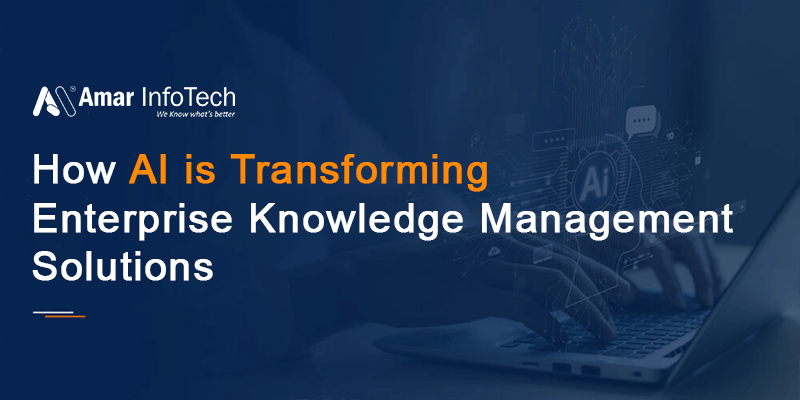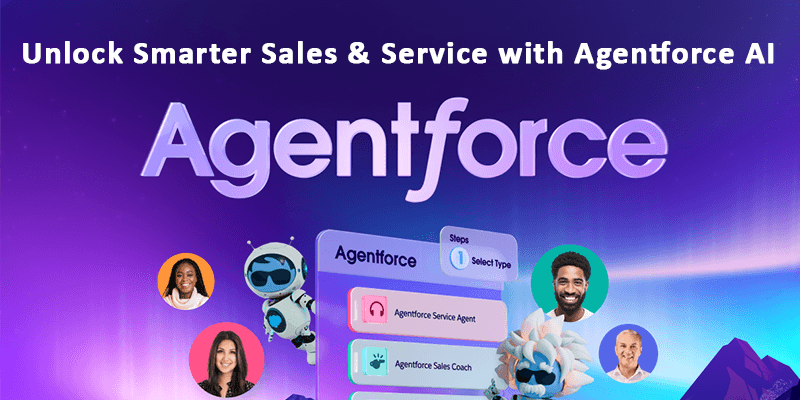Ready for Digital Transformation? Your Vision, Our Expertise - Let’s Build Innovative Software Together!
How AI is Transforming Enterprise Knowledge Management Solutions
 Blog Future of AI
Blog Future of AI
In today’s fast-paced business environment, enterprises across the United States are increasingly turning to Artificial Intelligence (AI) to streamline and enhance their Knowledge Management (KM) solutions. AI has the power to revolutionize the way organizations manage, retrieve, and utilize knowledge, ensuring that companies remain competitive, efficient, and adaptable to changing market conditions.
The Shift Toward AI-Driven Knowledge Management
Traditionally, Knowledge Management has relied on manual processes such as document storage, human-driven tagging, and static information repositories. However, these methods often fall short when it comes to organizing and retrieving vast amounts of data across different departments, locations, and systems.
AI introduces intelligent automation, machine learning (ML), natural language processing (NLP), and other technologies that make Knowledge Management solutions more efficient and user-friendly. For businesses in the USA, this shift is proving essential in an era where digital transformation and data-driven decision-making are crucial for success.
Key Ways AI is Transforming Knowledge Management
1. Smarter Knowledge Retrieval
AI-powered KM systems can help businesses in the USA improve knowledge retrieval by understanding the context behind search queries. Machine learning algorithms analyze past search behaviors and usage patterns to provide more accurate and relevant results. Whether it’s for customer support teams or research and development, AI ensures that employees quickly access the right information when they need it most.
2. Automating Knowledge Capture
In enterprises where large teams are collaborating across different time zones, such as in tech companies in Silicon Valley or financial institutions in New York, capturing knowledge from various sources can be overwhelming. AI enables automation by capturing unstructured data (emails, documents, meeting notes) and converting it into structured formats, making it easier for organizations to manage.
3. Enhanced Collaboration
AI-powered chatbots, virtual assistants, and smart collaboration tools are transforming team collaboration. These tools assist employees in finding relevant knowledge without sifting through lengthy documents or email threads. AI systems like Slack integrations, Microsoft Teams bots, or custom AI assistants are becoming increasingly popular among American enterprises to foster seamless collaboration and knowledge sharing.
4. Predictive Analytics for Decision-Making
One of the most significant advantages AI brings to Knowledge Management in the US is its ability to generate insights and predict future trends. By analyzing historical data, AI tools can provide businesses with recommendations that are critical for making informed, data-backed decisions. This predictive ability can impact everything from product development to customer service and employee training.
5. Personalized Knowledge Management
AI systems are capable of learning about individual users’ preferences, helping tailor knowledge resources to their specific needs. This personalized approach is especially beneficial for large organizations, where the variety of knowledge users and use cases can be overwhelming. By offering customized knowledge suggestions, AI ensures employees are empowered with the right tools at the right time.
AI in Action: US-Based Case Studies
1. AI in Healthcare Knowledge Management (USA)
In the healthcare sector, AI is being used to streamline the management of clinical knowledge. US hospitals and healthcare providers are deploying AI-based systems to store medical records, retrieve diagnostic information, and offer medical insights. This allows healthcare professionals to spend more time with patients while ensuring that all relevant knowledge is accessible at their fingertips.
2. AI for Legal Knowledge Management
US law firms are adopting AI tools to enhance their knowledge management processes. From reviewing case documents to automating contract analysis, AI-driven solutions are significantly reducing manual labor and improving efficiency. By leveraging AI to manage knowledge, legal professionals can focus more on strategic work rather than administrative tasks.
Benefits of AI-Powered Knowledge Management for US Enterprises
- Increased Productivity: By automating repetitive tasks like data entry and content categorization, AI allows employees to focus on high-value work, increasing overall productivity.
- Improved Knowledge Retention: AI-powered systems can continuously learn and adapt, ensuring that knowledge is not lost when employees leave the company, especially critical in industries such as technology, manufacturing, and legal services in the USA.
- Faster Decision-Making: With AI providing real-time insights and predictive analytics, American businesses can make faster, more informed decisions that help them stay ahead of the competition.
- Enhanced Customer Service: AI can improve customer service by quickly retrieving accurate information for service agents, automating responses, and enabling 24/7 customer support—critical for businesses with global reach, including those in the USA.
Challenges and Considerations
While AI holds immense promise for Knowledge Management, there are challenges to consider, especially for US enterprises. Data privacy and security remain top concerns, especially with stringent regulations like the California Consumer Privacy Act (CCPA) and other federal and state laws. Additionally, businesses need to ensure that AI systems are properly integrated with existing knowledge management systems to avoid silos.
Conclusion: The Future of AI in Knowledge Management in the USA
As AI continues to evolve, its role in Knowledge Management will only grow more significant. Enterprises in the United States are already experiencing the transformative effects of AI, and as the technology matures, its potential for driving efficiency, collaboration, and innovation will become even more impactful. For businesses looking to remain competitive in the digital age, investing in AI-driven Knowledge Management solutions is not just an option but a necessity.





